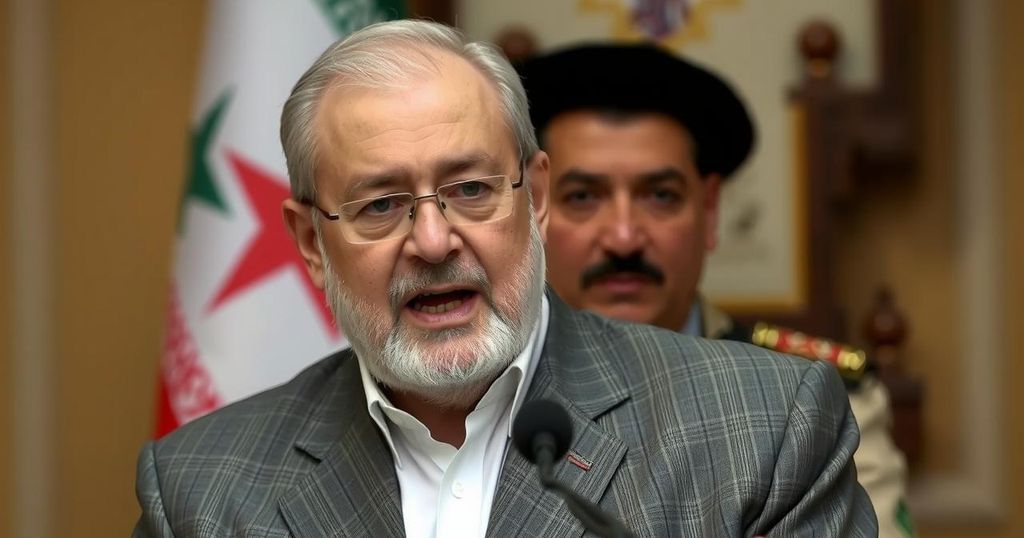Iran and Hezbollah Accused of Inciting Protests in Syria’s Coastal Cities

In Syria, protests have erupted amid accusations against Iran and Hezbollah for inciting unrest. Colonel Riyad al-Asaad claims that these entities are instigating violence to disrupt stability. The situation has escalated, with armed confrontations occurring in key areas, subsequently raising concerns over Iranian influence in post-Assad Syria. As local sentiments shift against regime loyalties, the situation demands attention from regional powers and international observers.
Recent protests in Syria’s coastal cities have raised accusations against Iran’s regime and Hezbollah for instigating unrest. Colonel Riyad al-Asaad, the founder of the Free Syrian Army, asserted that intelligence supports claims of Hezbollah deploying agents in Syria to exacerbate tensions. This unrest has escalated into violence, confirmed by reports of armed confrontations following inflammatory actions linked to the Assad regime.
Initial demonstrations, triggered by a video showing an attack on an Alawite shrine, have unfolded into a broader movement evident of Iranian interference. Hezbollah’s operatives are reportedly mobilizing to restore influence in Syria, particularly in regions like Talkalakh adjoining Lebanon, resulting in significant clashes with opposition forces. Moreover, the violent outcome of these events marks a critical shift in the dynamics of Syrian politics post-Assad.
Military responses have intensified as authorities focus on curtailing violence, leading to strategic arrests among regime loyalists. The local populace appears to pivot towards the new Syrian administration, indicating a gradual shift in allegiance. Furthermore, Iranian officials’ statements coinciding with the protests have only intensified suspicions surrounding Tehran’s involvement in orchestrating the chaos.
In response to these developments, the Arab League condemned Iranian provocations in Syria, highlighting the dangers of external interference in regional stability. Supreme Leader Ali Khamenei’s remarks concerning the potential for a resilient Syrian youth movement show continued Iranian ambitions to influence Syria’s trajectory. Ultimately, as long as Iran’s clerical regime persists, stability in Syria and the broader Middle East will remain uncertain.
In summary, the interplay of local protests, Iranian involvement, and shifting power dynamics underscores a fraught atmosphere in Syria. Furthermore, regional voices, including the Arab League, are increasingly vocal against Iranian meddling. The implications of these tensions can reshape the landscape of Syrian politics in the coming years.
The article discusses the recent surge of protests in Syria, particularly along the coastal regions, amid allegations that the Iranian regime and Hezbollah are inciting chaos to destabilize the area. This unrest arises from historical tensions related to the Assad regime and the influence of Iranian operatives and proxies in the region. Colonel Riyad al-Asaad’s insights depict a complex interaction of violence stemming from both local dissent and external manipulations, primarily by Iranian-affiliated forces. As the protests illuminate deeper issues of Iranian influence in Syria, this context sheds light on the fragile political landscape following the Assad regime’s decline. The influence of Hezbollah and the strategic maneuvers of Iranian regimes signal intensifying challenges for stability in Syria and the broader implications for Middle Eastern geopolitics.
The protests erupting in Syrian coastal cities illustrate the intricate challenges of Iranian and Hezbollah influences in the country’s political resurrection following the Assad regime. The interplay between local discontent and foreign intervention can significantly alter Syria’s future trajectory. As tensions escalate amid violent confrontations and accusations of destabilization, the regional and international implications of these events present crucial considerations for peace and stability in the Middle East.
Original Source: www.ncr-iran.org








